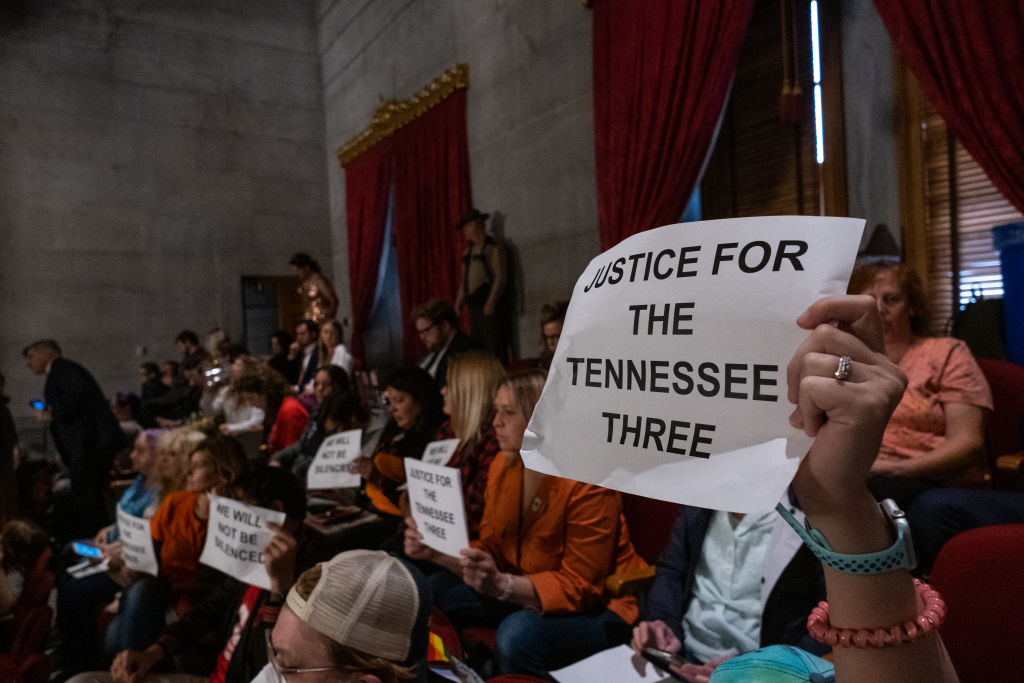Understanding the bipartisan gun-control proposal
How the left and right united to write the historic legislation


A free daily email with the biggest news stories of the day – and the best features from TheWeek.com
You are now subscribed
Your newsletter sign-up was successful
A bipartisan group of 20 senators announced Sunday that they had reached an agreement on what could become the first major piece of gun-control legislation in more than 25 years to be signed into law. Here's everything you need to know:
What's in the bill?
According to a statement released by the senators, the proposed legislation would incentivize states to pass "red flag" laws, allowing guns to be confiscated from "individuals whom a court has determined to be a significant danger to themselves or others," though these confiscations would be limited by "state and federal due process and constitutional protections."
It would also direct billions of dollars toward mental health programs, increase funding for school security, expand background checks for gun buyers under the age of 21 to include juvenile justice records, and close the so-called "boyfriend loophole."
The Week
Escape your echo chamber. Get the facts behind the news, plus analysis from multiple perspectives.

Sign up for The Week's Free Newsletters
From our morning news briefing to a weekly Good News Newsletter, get the best of The Week delivered directly to your inbox.
From our morning news briefing to a weekly Good News Newsletter, get the best of The Week delivered directly to your inbox.
Current federal law prevents domestic abusers from buying firearms only if the person they abused was a current or former spouse, lives with or once lived with the abuser, or shares a child with the abuser. Hence, the "boyfriend loophole," since a boyfriend covered by a domestic violence protective order could buy all the guns he wanted as long as he never lived with the girlfriend he abused.
Will it pass?
It looks like it. The agreement hasn't been drafted as a bill yet, but as long as the 10 Republican senators who helped draw up the framework vote for it, the legislation should get the 60 votes it needs to overcome the filibuster and advance to President Biden's desk.
Of course, it's possible some Democrats won't be happy with the compromise. On Friday, Sen. Bernie Sanders (I-Vt.) tweeted his support for a ban on assault weapons and high-capacity magazines. "If we can't get 60 votes in the Senate" for those policies, he wrote, "then we must end the filibuster." Democrats already failed to end the filibuster earlier this year.
Senate Majority Leader Chuck Schumer (D-N.Y.) has promised to bring the bill to the Senate floor as soon as it's written up, and Senate Minority Leader Mitch McConnell (R-Ky.) did not come out against it. In fact, McConnell said Tuesday that he would be "supportive" if the bill "ends up reflecting what the framework indicates."
A free daily email with the biggest news stories of the day – and the best features from TheWeek.com
Nor is there much danger of Biden vetoing the bill because it doesn't go far enough. "Obviously, it does not do everything that I think is needed," he said, "but it reflects important steps in the right direction, and would be the most significant gun safety legislation to pass Congress in decades."
There is a bit of a time crunch, however, with the Senate scheduled to go into recess for the last week of June, the first week of July, and nearly all of August.
Which Senators hammered out the agreement?
The Democrats: Richard Blumenthal (Conn.), Cory Booker (N.J.), Chris Coons (Dela.), Martin Heinrich (N.M.), Mark Kelly (Ariz.), Angus King (Maine), Joe Manchin (W.Va.), Chris Murphy (Conn.), Kyrsten Sinema (Ariz.), and Debbie Stabenow (Mich.).
The Republicans: Roy Blunt (Mo.), Richard Burr (N.C.), Bill Cassidy (La.), John Cornyn (Texas), Lindsey Graham (S.C.), Susan Collins (Maine), Rob Portman (Ohio), Mitt Romney (Utah), Thom Tillis (N.C.), and Pat Toomey (Penn).
In a joint statement, the senators wrote that "families are scared, and it is our duty to come together and get something done that will help restore their sense of safety and security in their communities." Murphy and Cornyn took the lead for their respective parties' delegations.
Alexandra DeSanctis of National Review notes that none of the GOP senators who worked on the deal are facing re-election in 2022 and that four of them plan to retire after their current term.
What's the response on the right?
Reps. Lauren Boebert (R-Colo.), Ronny Jackson (R-Texas), and Mary Miller (R-Ill.) were among those who took to Twitter to lambast the proposal. Jackson said the agreement was "AWFUL!," while Miller said she would "vote against the Biden-Schumer gun confiscation legislation."
Most of the objections from the right focused on the provisions that would incentivize states to implement red flag laws. Pseudonymous right-wing populist political commentator Auron MacIntyre was one such voice of concern, tweeting that "if they pass red flag laws, any disagreement with the ruling ideology will be a red flag." He also criticized Republicans for supporting what he called a "functional repeal of the Second Amendment."
Conservative podcaster Ben Shapiro also worried that red flag laws could be weaponized to serve a political agenda. In 2019, Rep. Eric Swalwell (D-Calif.) replied to a clip from Shapiro's show by tweeting, "Please tell me this lunatic does not own a gun. Reason 1,578 America needs red flag laws." In response, Shapiro wrote Monday, "I am not in principle opposed to red flag laws. But when sitting congresspeople … suggest your right to self-defense should be removed because you oppose his political agenda, that undermines the trust necessary to support such laws."
What's the response on the left?
Writing for Vox, Ellen Ioanes criticized the agreement for focusing "primarily on mental health and school security interventions, rather than meaningfully restricting access to firearms," though she also wrote that, if the proposal becomes law, it could provide "some actual momentum to enact legislation that will curb gun violence and will save lives."
The Washington Post's editorial board also said the framework didn't go far enough. "[W]e think other reforms are needed. Notably, addressing the danger posed by assault weapons and high-capacity magazines — either banning them or, at the very least, raising the minimum age for buying them from 18 to 21," the board wrote.
In the end, though, the editorial board urged Congress to pass the legislation, writing that although it "won't save all lives lost to gun violence" it "will save some" and that the agreement serves as "a hopeful sign our government is not completely broken."
Grayson Quay was the weekend editor at TheWeek.com. His writing has also been published in National Review, the Pittsburgh Post-Gazette, Modern Age, The American Conservative, The Spectator World, and other outlets. Grayson earned his M.A. from Georgetown University in 2019.
-
 Is Andrew’s arrest the end for the monarchy?
Is Andrew’s arrest the end for the monarchy?Today's Big Question The King has distanced the Royal Family from his disgraced brother but a ‘fit of revolutionary disgust’ could still wipe them out
-
 Quiz of The Week: 14 – 20 February
Quiz of The Week: 14 – 20 FebruaryQuiz Have you been paying attention to The Week’s news?
-
 The Week Unwrapped: Do the Freemasons have too much sway in the police force?
The Week Unwrapped: Do the Freemasons have too much sway in the police force?Podcast Plus, what does the growing popularity of prediction markets mean for the future? And why are UK film and TV workers struggling?
-
 ATF finalizes rule to close 'gun show loophole'
ATF finalizes rule to close 'gun show loophole'Speed Read Biden moves to expand background checks for gun buyers
-
 Why the New Mexico governor's gun ban backfired
Why the New Mexico governor's gun ban backfiredCritics say the Constitution isn't the only reason to oppose a 30-day gun ban in the name of public health
-
 Is the Comstock Act back from the dead?
Is the Comstock Act back from the dead?Speed Read How a 19th-century law may end access to the abortion pill
-
 Tennessee House GOP moves to expel 3 Democrats over 'disorderly' gun reform protest
Tennessee House GOP moves to expel 3 Democrats over 'disorderly' gun reform protestSpeed Read
-
 Ron DeSantis signs bill to allow concealed guns without a permit
Ron DeSantis signs bill to allow concealed guns without a permitSpeed Read
-
 Targeting the press
Targeting the pressSpeed Read Some public officials want to roll back long-standing legal protections for journalists. Might they succeed?
-
 New Jersey man tried to board airplane with numerous firearms, DOJ says
New Jersey man tried to board airplane with numerous firearms, DOJ saysSpeed Read
-
 The dangers faced by LGBTQ people in the Middle East
The dangers faced by LGBTQ people in the Middle EastSpeed Read Why do so many Middle Eastern countries have anti-LGBTQ laws, and what can be done to make a change?
